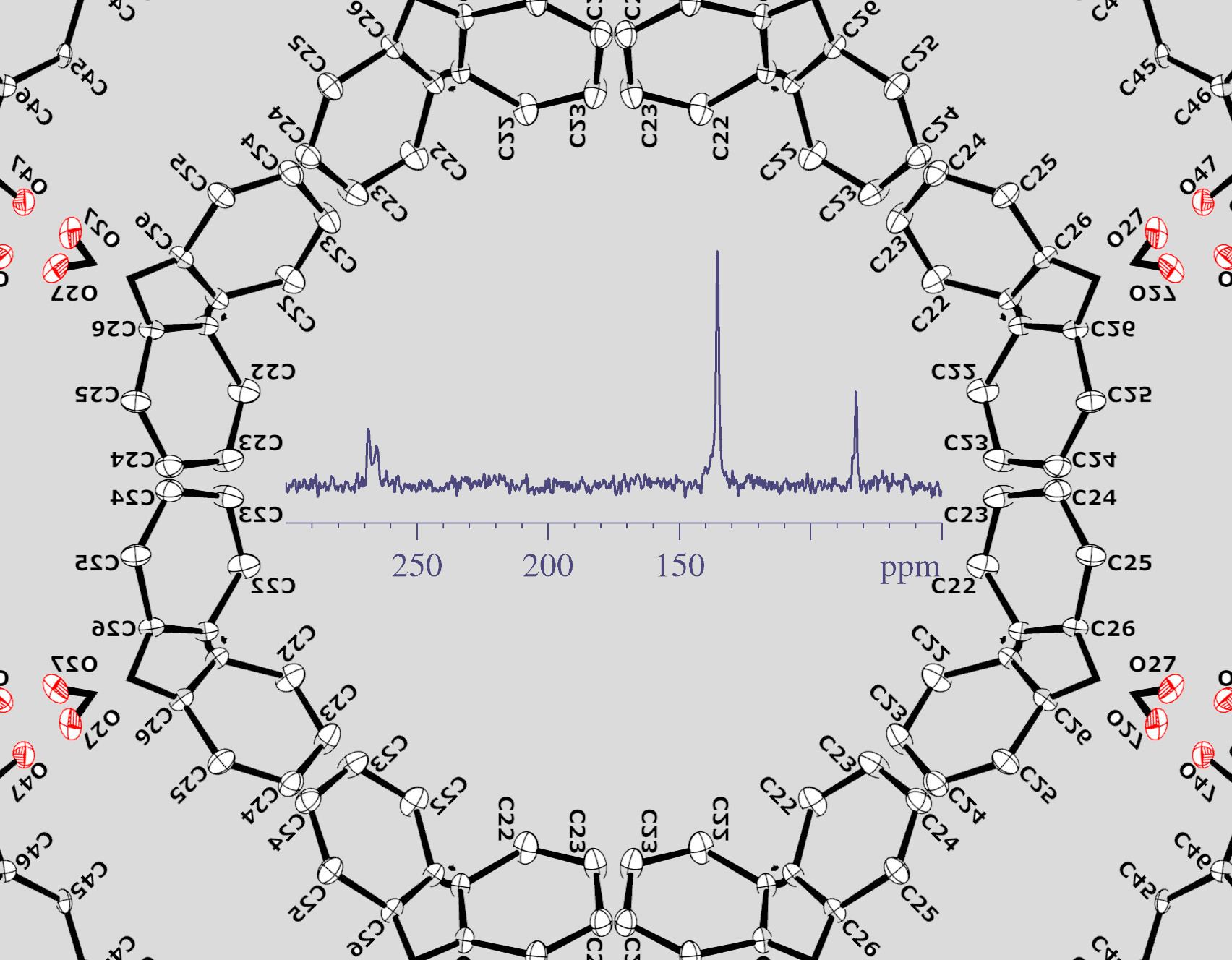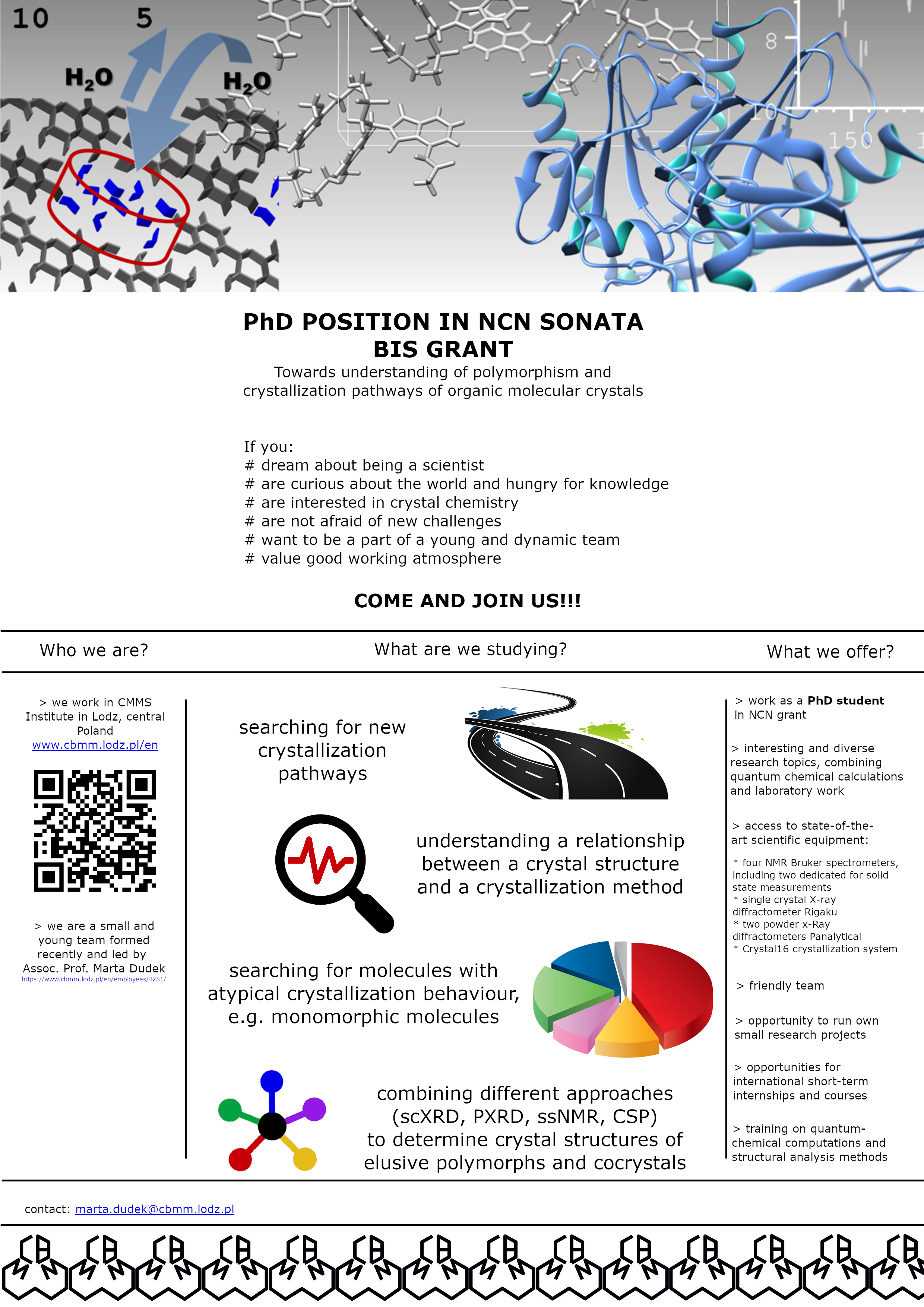
We are a newly created team, launched in 2024, exploring polymorphism and crystallization processes of organic compounds. We aim to gain a better control over crystallization through a joint use of crystal structure prediction calculations (CSP) and crystallization experiments in a lab. We are also developing application possibilities for CSP and NMR Crystallography to tackle difficult structural problems of organic crystals.

National Science Center grant SONATA BIS 2022/46/E/ST4/00392 “Towards understanding of polymorphism and crystallization pathways of organic molecular crystals” – the description of the project for general public can be found here.
Crystallization
Crystallization is a very complex process, in which both kinetic and thermodynamic factors are at play. Our research is focused on the understanding of this process so that we will hopefully be able not only to predict its outcome, but also to influence it according to our needs. To that purpose we are exploring new, easier to control approaches to crystallization in comparison with a classical solution crystallization methods. Among the tested approaches are mechanochemical reactions, crystallization from melt or desolvation processes. The conducted experiments are compared with crystal structure prediction calculations (CSP), leading to a better understanding of the crystal energy landscapes of the studied molecules and their tendencies to crystallize in their specific forms.
Polymorphism and cocrystals
Crystal polymorphism, i.e. the ability of a given compound to form different crystal structures, which can have distinct packing arrangements and/or different conformation of molecules in a crystal, significantly influences their physicochemical properties, including solubility, thermal stability, tabletability, colour, odour and many others. Because of that it is important to know all crystallizable polymorphic forms of widely used chemical substances, especially drugs or agrochemicals. Our research is focused on crystallization and structural characteristic of new polymorphs, with an emphasis on cocrystals, formed by two or more chemicals bound together in one crystal lattice.
CSP and NMR crystallography
In our research it is important to elucidate crystal structures of all crystallized crystal forms. If only possible we use to that purpose single crystal X-Ray crystallography, but many of the crystalized solids are microcrystalline powders, making it impossible to use this technique. Because of that we are constantly developing methods based on NMR crystallography and its joint use with CSP. This part of our research is conducted in a close collaboration with prof. Marek Potrzebowski’s team.
2025
Małgorzata Kołtun-Jasion, Marta Katarzyna Dudek, and Anna Karolina Kiss. Eucommiae cortex Comprehensive Phytochemical Analysis Connected with Its In Vitro Anti-Inflammatory Activity in Human Immune Cells. Molecules 2025, 30, 1364 https://doi.org/10.3390/molecules30061364
Przemysław Nowak, Anna Pietrzak, Marta K. Dudek. Understanding the stability of amorphous form of darifenacin. CrystEngComm, 2025, 27, 1927-1938 https://doi.org/10.1039/D4CE01257G
Sharon E. Ashbrook, Gregory J. O. Beran, Jan Blahut, Frédéric Blanc, Lee Brammer, Harry Brough, Steven P. Brown, Carlos Bornes, Thibault Charpentier, Martin Dracinsky, Marta K. Dudek, Lyndon Emsley, Thomas Fellowes, Christel Gervais, Kent J. Griffith, John Griffin, Gillian R. Goward, Paul Hodgkinson, Colan E. Hughes, Michael A. Hope, Simo-ne S. Köcher, Danielle Laurencin, Zhiyuan Li, Sten O. Nilsson Lill, Andrew J. Morris, Leonard J. Mueller, Sarah L. Price and Jonathan R. Yates. Challenges and opportunities for NMR calculations: general discussion. Faraday Discuss., 2025, 255, 288-310 https://doi.org/10.1039/D4FD90055C
Sharon E. Ashbrook, Frédéric Blanc, Steven P. Brown, Thibault Charpentier, Martin Dracinsky, Marta K. Dudek, Lyndon Emsley, Christel Gervais, Andrew L. Goodwin, Gillian R. Goward, John Griffin, Angela F. Harper, Kenneth D. M. Harris, Paul Hodgkinson, Jacob B. Holmes, Michael A. Hope, Colan E. Hughes, Simone S. Köcher, Zhiyuan Li, Sten O. Nilsson Lill, Céline Merlet, Andrew J. Morris, Leonard J. Mueller, Sarah L. Price, Benjamin J. Rhodes and Heitor S. Seleghini. Generating models that describe complex disorder: general discussion. Faraday Discuss., 2025, 255, 391-410 https://doi.org/10.1039/D4FD90056A
Sharon E. Ashbrook, Gregory J. O. Beran, Jan Blahut, Frédéric Blanc, Carlos Bornes, Lee Brammer, Steven P. Brown, Thibault Charpentier, Martin Dračínský, Marta K. Dudek, Lyndon Emsley, Carl H. Fleischer, Andrew L. Goodwin, Angela F. Harper, Kenneth D. M. Harris, Paul Hodgkinson, Michael A. Hope, Colan E. Hughes, Simone S. Köcher, Zhiyuan Li, Andrew J. Morris, Leonard J. Mueller, Sten O. Nilsson Lill, Sarah L. Price, Benjamin J. Rhodes and Daria Torodii. Big data and simulations in NMR crystallography: general discussion. Faraday Discuss., 2025, 255, 159-191 https://doi.org/10.1039/D4FD90054E
Sharon E. Ashbrook, Jan Blahut, Frédéric Blanc, Lee Brammer, Thibault Charpentier, Chia-Hsin Chen, Martin Dracinsky, Marta K. Dudek, Thomas Fellowes, Carl H. Fleischer, Christel Gervais, Andrew L. Goodwin, Gillian R. Goward, John Griffin, Kent J. Griffith, Angela F. Harper, Kenneth D. M. Harris, Paul Hodgkinson, Jacob B. Holmes, Michael A. Hope, Colan E. Hughes, Yaroslav Z. Khimyak, Simone S. Köcher, Danielle Laurencin, Andrew J. Morris, Leonard J. Mueller, Sten O. Nilsson Lill, Mario Antonio Ongkiko, Christopher Owen, Tran N. Pham, Sarah L. Price, Pierre Thureau, Daria Torodii and Vadim Zorin. Understanding dynamics and mechanisms: general discussion. Faraday Discuss., 2025, 255, 553-582 https://doi.org/10.1039/D4FD90057J
Agata Jeziorna, Maura Malinska, Isaac Sugden, Piotr Paluch, Rafał Dolot, Marta K. Dudek. SCXRD, CSP-NMRX and microED in the quest for three elusive polymorphs of meloxicam. IUCrJ 2025, 12, 109-122 https://doi.org/10.1107/S2052252524011898
Marta K. Dudek. Crystal Structure Prediction. Chapter in NMR Crystallography 2025 ed. David Bryce, Royal Society of Chemistry
Szymon K Araj, Łukasz Szeleszczuk, Tomasz Gubica, Monika Zielińska-Pisklak, Kostas Bethanis, Elias Christoforides, Marta K. Dudek, D. Maciej Pisklak. Physicochemical and structural analysis of N-phenylacetyl-L-prolylglycine ethyl ester (Noopept) – an active pharmaceutical ingredient with nootropic activity. Journal of Pharmaceutical and Biomedical Analysis 2025, 252, 116474 https://doi.org/10.1016/j.jpba.2024.116474
2024
Mechanochemical Transformations of Pharmaceutical Cocrystals: Polymorphs and Coformer Exchange Katarzyna Trzeciak, Marta K. Dudek, Marek J. Potrzebowski. Chem. Eur. J. 2024, 30, e202402683 https://doi.org/10.1002/chem.202402683
Jan Glinski, Michał Gleńsk, Vitold Glinski, Bianca Silverman, Marta K. Dudek. Conformational preferences of cocoa oligomeric proanthocyanidins and their influence on polarity. J. Chromatogr. A 2024, 1734, 465294 https://doi.org/10.1016/j.chroma.2024.465294
Anna H. Mazurek, Łukasz Szeleszczuk, Kostas Bethanis, Elias Christoforides, Marta K. Dudek, Ewelina Wielgus, Dariusz Maciej Pisklak. 17-β-Estradiol—β-Cyclodextrin Complex as an aqueous solution: Structural and Physicochemical Characterization supported by MM and QM calculations. J. Mol. Struct. 2024, 1313, 138710 https://doi.org/10.1016/j.molstruc.2024.138710
Mehrnaz Khalaji, Marta K Dudek, Laurent Paccou, Florence Danede, Yannick Guinet and Alain Hedoux. Description of an original molecular ordering process into a disordered crystalline form: the atypical low-temperature transformation of the disordered form III of linezolid. Phys. Chem. Chem. Phys. 2024, 26, 20709 https://doi.org/10.1039/D4CP02104E
Andrzej Patyra, Justine Vaillé, Soufiyan Omhmmed, Marta K. Dudek, Jérémie Neasta, Anna K. Kiss, Catherine Oiry, Pharmacological and phytochemical insights on the pancreatic β-cell modulation by Angelica L. roots. J. Enthnopharmacol. 2024, 118133 https://doi.org/10.1016/j.jep.2024.118133
Kornel Roztocki, Monika Szufla, Filip Formalik, Volodymyr Bon, Anna Krawczuk, Piotr Paluch, Marta K. Dudek, Stefan Kaskel, Dariusz Matoga. Theoretical and experimental insights into the spatial distribution of functional groups in multivariate flexible metal-organic framework JUK-8(Br)(NO2) ChemRxiv 2024 10.26434/chemrxiv-2024-274k4
Marta K. Dudek, Katarzyna Trzeciak, Justyna Zając, Sławomir Kaźmierski, Edyta Pindelska, Marek Potrzebowski, Lidia Tajber, Tomasz Makowski, Mariia Svyntkivska. A new look at the mechanism of cocrystal formation and coformers exchange in processes forced by mechanical and/or thermal stimuli – ex situ and in situ studies of low-melting eutectic mixtures. Chem. Eur. J. 2024, 30, e202302138 https://doi.org/10.1002/chem.202302138
2023
Agata Jeziorna, Piotr Paluch, Justyna Zając, Rafał Dolot, Marta K. Dudek. Crystallization of elusive polymorphs of meloxicam informed by crystal structure prediction. Cryst. Growth Des. 2023, 23, 5998–6010; https://doi.org/10.1021/acs.cgd.3c00559